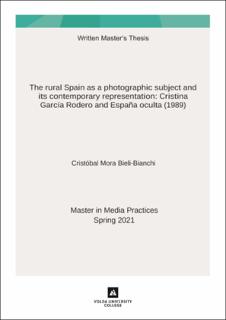| dc.contributor.advisor | Franklin, Stuart | |
| dc.contributor.author | Mora Bieli-Bianchi, Cristóbal | |
| dc.coverage.spatial | Spain | en_US |
| dc.coverage.temporal | 1973-1989 | |
| dc.date.accessioned | 2023-03-02T13:06:16Z | |
| dc.date.available | 2023-03-02T13:06:16Z | |
| dc.date.issued | 2021 | |
| dc.identifier.uri | https://hdl.handle.net/11250/3055410 | |
| dc.description | Resumen
El presente proyecto plantea un recorrido histórico de la fotografía rural española a lo largo del
siglo XX. Desde Luis Escobar en la década de los 20, pasando por W. Eugene Smith en los 50,
hasta Cristina García Rodero y su España oculta, publicado en 1989 y considerado como uno
de los grandes libros fotográficos del documentalismo español. Esta tesis plantea buscar
aquellos puntos en común en la fotografía rural española, un género menor, pero de gran
repercusión debido a quienes han fotografiado estas áreas del país, el peso de los mitos y
estereotipos en su representación y su importancia cultural y académica en el contexto rural
español actual. A través de un análisis histórico, una entrevista con Cristina García Rodero y
un análisis de contenido respecto a las diferentes fotografías, el principal objetivo es descubrir
cómo se ha representado la realidad rural española a lo largo del siglo pasado y cómo España
oculta consiguió romper, en cierto modo, con una tradición arraigada en la cultura española,
como es el mito de la España negra. | sp_ES |
| dc.description.abstract | Abstract This project presents a historical journey of Spanish rural photography throughout the 20th century. From Luis Escobar in the 20s, through W. Eugene Smith in the 50s, to Cristina García Rodero and her España oculta, published in 1989 and considered as one of the greatest photo books of Spanish documentary photography. This thesis proposes to look for those common traits in Spanish rural photography, a minor genre, but of great repercussion due to those who have photographed these areas of the country, the weight of myths and stereotypes in their representation, and their cultural and academic importance in the current Spanish rural context. Through a historical analysis, an interview with Cristina García Rodero, and a content analysis regarding the different photographs, the main objective is to discover how the Spanish rural reality has been represented throughout the last century and how España oculta managed to break, in a way, with a tradition rooted in Spanish culture, such as the España negra myth. | en_US |
| dc.language.iso | eng | |
| dc.publisher | Høgskulen i Volda | nn_NO |
| dc.subject | García Rodero, Cristina | |
| dc.subject.ddc | 779.0945 | |
| dc.subject.other | España negra - rural Spain | en_US |
| dc.title | The rural Spain as a photographic subject and its contemporary representation: Cristina García Rodero and España oculta (1989) | en_US |
| dc.type | Master thesis | en_US |
| dc.description.version | publishedVersion | en_US |
| dc.source.pagenumber | 95 | |
| dc.description.localcode | MMP | |
| dc.subject.lcc | Documentary photography | en_US |
| dc.subject.lcc | Popular culture - Spain | en_US |
| dc.subject.lcc | Spain - Social life and customs | en_US |
| dc.subject.lcc | Images, Photographic | en_US |
